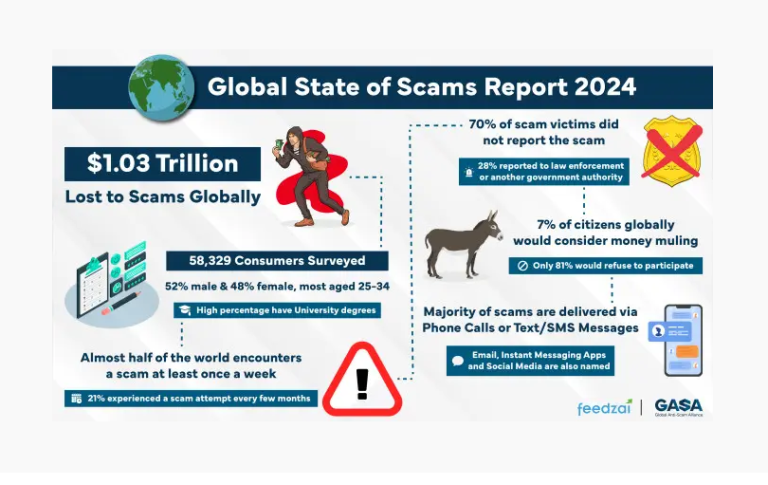The Global Anti-Scam Alliance (GASA), alongside its partner Feedzai, has released its 2024 Global State of Scams report, revealing the enormous scale of financial loss to global scams, which reached a staggering US $1.03 trillion over the past year. Based on insights from over 58,000 respondents across various nations, the report not only highlights the financial toll of these scams but also the significant regional disparities in scam impact and public awareness.
Awareness campaigns appear to be falling short as nearly half of global consumers report being targeted by scammers weekly. Countries like Brazil, Hong Kong, and South Korea experience near-daily attempts, while some, including Vietnam, Saudi Arabia, and China, report lower scam incidence.
“Over the past year, very little has changed in scam frequency,” said Jorij Abraham, Managing Director of GASA. “Our systems are still vulnerable, trust continues to erode, and billions remain at risk. It’s clear that more must be done to mitigate these crimes, which take an immense toll on economies and individuals alike.”
Developed vs Developing Nations: Different Burdens
While wealthier nations report the highest per capita losses, developing countries bear a heavier economic impact as scams cut deeply into their GDP. The U.S., Denmark, and Switzerland saw some of the largest financial losses per victim, with Americans losing an average of $3,520 each. However, in countries like Pakistan, scams account for an alarming 4.2% of GDP. Kenya and South Africa also reported significant impacts, with scams equivalent to 3.6% and 3.4% of GDP, respectively.
The disparity underscores the need for region-specific interventions. While developed nations may recover more easily from financial losses, for lower-income economies, scams pose a serious risk to economic stability, calling for both financial and technological interventions to support these economies in tackling fraud.
Emotional Cost of Scams Varies Globally
Scams inflict not only financial but also significant emotional damage, which varies greatly across regions. In Kenya, South Africa, and the Philippines, victims often report feeling deeply shaken and vulnerable, with scams eroding personal security and confidence. Yet in Japan and South Korea, while financial losses are still substantial, the emotional toll seems lighter, possibly reflecting cultural factors or different coping mechanisms.
Despite the frequent scams, global trust in the internet remains largely unaffected. However, online trust in developing nations did decline, hinting at a growing caution towards online platforms. The report suggests that as scams become more sophisticated, especially in digital settings, developing nations are increasingly wary of internet interactions.
Moving Towards Stronger Global Cooperation
The report highlights the urgent need for international cooperation to address the growing threat posed by scammers. While some progress has been made, only 4% of scam victims worldwide have managed to recover their losses, underscoring the difficulty of financial restitution in these cases.
Enhanced public awareness, stronger global collaboration, and faster financial recovery processes are among the report’s key recommendations. With scams showing no signs of slowing down, experts warn that time is of the essence to safeguard both economies and individuals from further harm.
The report calls on governments, private sectors, and individuals to take more decisive action, arguing that only a collective, global effort will reduce the financial and emotional toll of scams worldwide. For more information and to access the full Global State of Scams 2024 report, please visit https://www.gasa.org/research.

